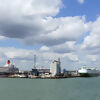13 Nights | Europe
About Leith, United Kingdom
You will visit the following 11 places:

Belfast
Belfast (meaning: "mouth of the sandbanks") is the capital and largest city of Northern Ireland, the second-largest city in Ireland after Dublin, and is situated around the River Lagan, which runs through the city. It is a port city known as the birthplace of the RMS Titanic, and for its political murals, documenting the ‘Troubles’ of the 20th century. Today, Belfast remains a centre for industry, as well as the arts, higher education, business, and law, and is the economic engine of Northern Ireland. The city suffered greatly during the period of conflict called "the Troubles", but latterly has undergone a sustained period of calm, free from the intense political violence of former years, and substantial economic and commercial growth. Additionally, Belfast city centre has undergone considerable expansion and regeneration in recent years, notably around Victoria Square.

Dundee

Southampton
Southampton is the largest city in the county of Hampshire on the south coast of England, and is situated 120 kilometres (75 mi) south-west of London and 30 kilometres (19 mi) north-west of Portsmouth. Southampton is a major port and the closest city to the New Forest. It lies at the northernmost point of Southampton Water at the confluence of the River Test and River Itchen, with the River Hamble joining to the south of the urban area. The local authority is Southampton City Council, which is a unitary authority. Just over a quarter of the jobs available in the city are in the health and education sector. A further 19 per cent are property and other business and the third largest sector is wholesale and retail, which accounts for 16.2 percent. Between 1995 and 2004, the number of jobs in Southampton has increased by 18.5 per cent. Southampton has always been a port, and the docks have long been a major employer in the city. In particular, it is a port for cruise ships; its heyday was the first half of the 20th century, and in particular the inter-war years, when it handled almost half the passenger traffic of the UK. Today it remains home to luxury cruise ships, as well as being the largest freight port on the Channel coast and fourth largest UK port by tonnage, with several container terminals. Unlike some other ports, such as Liverpool, London, and Bristol, where industry and docks have largely moved out of the city centres leaving room for redevelopment, Southampton retains much of its inner-city industry.

Cork
Cork - meaning "marsh", is a city in Ireland located in the South-West Region in the province of Munster. With a population of 125,622, it is the second largest city in the state and the third most populous on the island of Ireland. The city is built on the River Lee which splits into two channels at the western end of the city; the city centre is divided by these channels. They reconverge at the eastern end where the quays and docks along the river banks lead outwards towards Lough Mahon and Cork Harbour, one of the world's largest natural harbours. The city's cognomen of "the rebel city" originates in its support for the Yorkist cause during the English 15th century Wars of the Roses. Corkonians often refer to the city as "the real capital" in reference to the city's role as the centre of anti-treaty forces during the Irish Civil War.

South Dublin
Dublin is the largest and capital city of Ireland. The English name is derived from the Irish name Dubh Linn, meaning "black pool". It is a primate city with an urban population of over 1 million, containing almost 25% of the country's population. Dublin is situated near the midpoint of Ireland's east coast, at the mouth of the River Liffey, and at the centre of the Dublin Region. The city is listed by the Globalization and World Cities Research Network (GaWC) as a global city, with a ranking of "Alpha-", placing it among the top thirty cities in the world. It is a historical and contemporary centre for education, the arts, administration, economy and industry.

Kirkwall

St. Peter Port

Douglas

Leith

Invergordon











